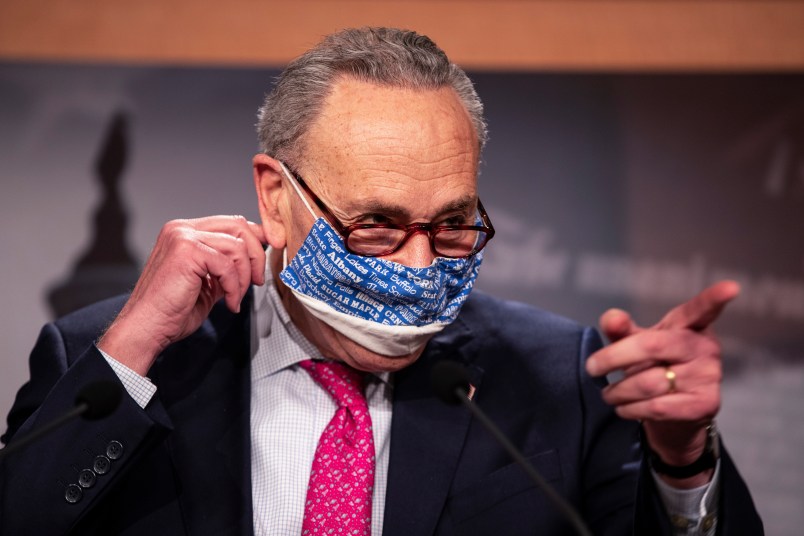Senate Minority Leader Mitch McConnell (R-KY) relinquished his block on the Senate organizing resolution Monday night after demanding that Democrats promise not to abolish the filibuster and dramatically curtail the minority’s power.
While Senate Majority Leader Chuck Schumer (D-NY) publicly refused to make such a promise, McConnell said that reiterated opposition to abolishing it by Senators Kyrsten Sinema (D-AZ) and Joe Manchin (D-WV) was good enough.
McConnell backing down allows Democrats to rightfully take over the effective majority, changing over the committee chairmanships and giving the new members committee assignments.
But it did not draw a line under the filibuster fight, which will almost certainly come to the fore again — even with Manchin and Sinema’s current posture. (Schumer would need every Democratic senator on board to use the nuclear option on the filibuster, this time extending it to all legislation.)
After all, this has happened before — politicians tend to be against abolishing the filibuster until a big party priority is blocked by the minority.
That applies to both Democrats and Republicans. In 2005, then Minority Leader Harry Reid (D-NV) called the filibuster the “last check we have against the abuse of power in Washington.” Then in 2013, in the face of Republican obstruction of former President Barack Obama’s nominees, he detonated the nuclear option, lowering the threshold to a simple majority on all nominees except for the Supreme Court.
McConnell has done the same, decrying Reid’s move as a “power grab” before proceeding to use the nuclear option himself in 2017 and 2019, lowering the vote threshold to circumvent Democrats’ blocking Neil Gorsuch’s path to the bench and two years later speeding up confirmation of district judges.
“Senate rules are sacrosanct and carved in stone until they’re not,” Eli Zupnick, spokesman for anti-filibuster group Fix Our Senate, told TPM. “Then the new rules are sacrosanct and carved in stone.”
Zupnick added that the atmosphere of the Senate right now feels a lot like it did in 2013, when Republicans made their obstructive intentions known early and forced Reid’s hand.
Not every member is so dependably flexible based on his party’s majority status, though: Manchin voted against the rule change back in 2013 too. Of course, the political calculus was a little different then, when Democrats had 55 Senate seats and could afford to let a few members break with the party.
While more fights over the filibuster seem inevitable, Democrats will likely to wait for the next brawl until Republicans are blocking some big, needed, popular legislation.
“The fact of the matter is, they were never gonna nuke the filibuster over arcane procedure,” Jim Manley, former spokesman for Senate Majority Leader Harry Reid and the Senate Democratic caucus, told TPM. “It’ll depend on getting the timing right and using the right issue — what exactly that is remains to be seen, but it’s certainly not gonna be over the organizing resolution.”
That issue would have to be important to the Democratic holdouts. If Sinema and Manchin are truly as opposed to abolishing the filibuster as they say, it won’t matter when Schumer decides to have the fight — McConnell’s power to block legislation is safe.
Democrats also have to balance holding out for that perfect issue with the very limited time they may have to govern. No party has held unified control for more than four years since 1968, and the last four times a President went into a midterm election with all three branches, voters flipped at least one of them. That reality, plus the legislative spike strip that is campaigning, makes decisions in these first few months critical.
For now, a busy Senate seems to be kicking the can down the road. Schumer indicated during a Tuesday press conference that the Senate may vote on a budget resolution as early as next week, readying the machinery to pass some version of Biden’s COVID-19 relief bill via budget reconciliation. Democrats are still negotiating with Republicans, and Schumer’s statement may be more of a pressure tactic than anything else, but Democrats could exercise one of their limited chances to legislate through the budget reconciliation process to avoid the minority filibuster.
They also have the impeachment trial coming up in the second week of February, which will likely suck up the chamber’s time.
But at some point, the tranche of progressive legislation Democrats and the Biden administration want to get done on everything from climate change to police reform could come up against McConnell’s obstruction.
“I don’t understand what Senators Manchin and Sinema are up to here: if they think Republicans are on the up-and-up, they’re just fooling themselves,” Manley said.
He added that he’s not ruling out hope that the conservative Democrats will come to their senses because “in six months, who knows what happens when they got very little done and are facing all-out obstruction on an infrastructure bill or something — what do they do then?”



